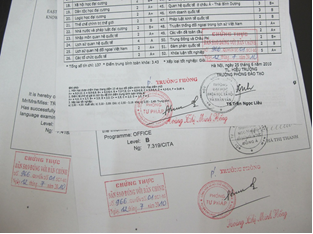The Law on Citizen Identification of 2014 was passed by the XIII National Assembly of the Socialist Republic of Vietnam during its 8th session on November 20, 2014, and came into effect on January 1, 2016.
Citizen Identification is the basic information about a citizen's background and identity. To meet the transaction needs of the populace and contribute to societal management, the Government of Vietnam has promulgated legal normative documents regulating citizen identification. However, to date, these regulations remain scattered and their enforcement is not robust. Meanwhile, the basic rights and obligations of citizens related to their identification (freedom of movement, transactions, the inviolability of private life, personal and family secrets) are recognized, respected, protected, and ensured by the State in the 2013 Constitution. In the context of integration, expanding international exchanges, cooperation, and administrative reform, there are demands to modernize identification documents using scientific, technical, and advanced technology achievements in line with global trends, the 2014 Citizen Identification Law was passed by the National Assembly during the 13th tenure, at the 8th session on November 20, 2014.

1. Structure of the Citizen Identification Law
The Citizen Identification Law consists of 6 Chapters, with 39 Articles.
- Chapter I: General Provisions include 7 articles (from Article 1 to Article 7), stipulating the scope of adjustment; subjects of application; interpretation of terms; principles of citizen identification management, the National Population Database, and the Citizen Identification Database; rights and obligations of citizens regarding citizen identification, the National Population Database, and the Citizen Identification Database; responsibility of the citizen identification management agency; and prohibited acts.
- Chapter II: The National Population Database, Citizen Identification Database consists of 2 sections and 10 articles (from Article 8 to Article 13), stipulating the requirements for building the national citizen identification database; information about citizens collected, updated into the National Population Database; management, exploitation, and utilization of the National Population Database; the relationship between the National Population Database and specialized databases; personal identification numbers; responsibilities of agencies, organizations, and individuals in collecting, providing, and updating information, and documents into the National Population Database; requirements for building and managing the Citizen Identification Database; information in the Citizen Identification Database; responsibilities of agencies, organizations, and individuals in collecting, providing, updating information and documents into the Citizen Identification Database; exploitation, provision, exchange, and utilization of citizen identification data.
- Chapter III: The Citizen Identification Card and the issuance, management of the Citizen Identification Card comprise 02 sections and 11 articles (from Article 18 to Article 28). Section 1 stipulates the content displayed on the Citizen Identification Card; individuals eligible for Citizen Identification Card issuance and Citizen Identification Card numbers; the usage value of the Citizen Identification Card; and the age for changing the Citizen Identification Card. Section 2 outlines the procedures for issuing the Citizen Identification Card; cases of replacement or reissuance of the Citizen Identification Card; the authority, procedures for replacement, reissuance of the Citizen Identification Card; the timeframe for issuance, replacement, reissuance of the card; locations for processing issuance, replacement, reissuance of the card; and revocation, temporary confiscation of the Citizen Identification Card.
- Chapter IV: Ensuring conditions for the management of citizen identification, the National Population Database, and the Citizen Identification Database includes 05 Articles (from Article 29 to Article 33), specifying the assurance of information infrastructure for the National Population Database and the Citizen Identification Database; personnel for managing citizen identification, the National Population Database, and the Citizen Identification Database; ensuring funding and physical facilities for the management of citizen identification, the National Population Database, and the Citizen Identification Database; fees for exploiting and using information in the National Population Database and fees for issuing, replacing, reissuing the Citizen Identification Card; and protection of the National Population Database and the Citizen Identification Database.
- Chapter V: The responsibility of managing citizen identification, the National Population Database, and the Citizen Identification Database, includes 4 articles (from Article 34 to Article 37), outlining the responsibilities of state management for citizen identification, the National Population Database, and the Citizen Identification Database; responsibilities of the Ministry of Public Security, other Ministries, sectors, and the People's Committees of provinces, centrally-run cities in managing citizen identification.
- Chapter VI: Implementation provisions include 02 articles (Article 38 and Article 39), specifying the effect of enforcement and transitional provisions; and detailed regulations and guidelines for implementation.
2. Basic contents of the Citizen Identification Law
- Scope of adjustment: This Law primarily provides for the management of citizen identification, the issuance, replacement, reissuance, and use of the Citizen Identification Card; emphasizing the use of the Citizen Identification Card to replace the Identity Card; ensuring effective management of the population and international integration; gradually realizing the Government of Vietnam as an electronic government. The inclusion of the National Population Database regulation in the Law aims to finalize the legal basis for building the National Population Database, issuing, and managing personal identification numbers, creating a fundamental change in organizing, and state management activities of the population towards modernity, simplification of administrative procedures, publicity, transparency, and facilitating the populace.
- Age for Citizen Identification Card issuance: The Law stipulates issuing a Citizen Identification Card to individuals from the age of 14. Issuing birth certificates for children under 14 will continue. This is entirely consistent with the child's right to birth registration, conforming with international practices where most countries issue Birth Certificates to prove birth information; it aligns with the nature of issuing the Citizen Identification Card – when an individual's identifying characteristics have stabilized and they are of age to bear legal responsibility.
- Information of citizens collected, updated into the National Population Database: The Law stipulates the basic information collected, updated into the National Population Database, uniformly used across specialized databases such as name, date of birth, gender, place of birth registration, ethnicity, religion, nationality, marital status, permanent residence, current residence, blood group, personal identification number or Identity Card number, nationality of father, mother, spouse or legal representative, etc. This information is managed by competent state agencies to connect, share, and use commonly, ensuring uniformity and accuracy in citizen data across specialized databases of institutions, and facilitating state management functions and transactions related to the populace.
- The National Population Database, Citizen Identification Database: The Citizen Identification Law establishes an entire chapter on the National Population Database, Citizen Identification Database, clarifying their relationship with other specialized databases. Building the National Population Database entails gathering primary, basic information about citizens, thereby developing an electronic citizen card to effectively serve citizens in civil transactions and assist state management activities concerning the populace. To be specific: the National Population Database will be uniformly built nationwide for shared use among agencies, organizations, and individuals to provide accurate, prompt basic information about the populace for state management work, meeting socio-economic development needs, and legitimate demands of citizens; for searching citizen information when handling administrative procedures, replacing the need to present or submit copies of citizen papers in administrative procedures; this will reduce paperwork for citizens (household registration books, marriage certificates, health insurance cards, personal tax codes...).
The National Population Database will both meet the information supply demand for agencies, organizations, individuals when required, while ensuring the privacy of personal information as per the law. Therefore, the Law clearly stipulates the responsibility of agencies, organizations, individuals in collecting, providing, updating information, and documents into the National Population Database and the Citizen Identification Database.
- Some basic contents of the Citizen Identification Card:
+ Expiry date of the Citizen Identification Card: Current citizen identification law stipulates the validity of identification papers as 15 years from the date of issuance. In reality, this does not fit different age groups since the extent of changes in identifying features varies with age. Hence, the Law stipulates: The card must be renewed when the citizen turns 25, 40, and 60 years old. If the card is issued, renewed, or reissued within 2 years before the specified age, it remains valid until the next renewal age.
+ Procedures for issuing, renewing, reissuing the Citizen Identification Card: The Law stipulates eliminating unnecessary documents for issuing, renewing, reissuing the Citizen Identification Card. Citizens arriving for the card issuance or reissuance only need to fill out the Citizen Identification Card application form. For card replacement due to changes in surname, middle name, name, identifying features, gender reassignment, place of origin, or incorrect information on the card that is not yet in the National Population Database, citizens must submit a copy of the competent authority's document about these changes.
+ Locations for processing issuance, renewal, reissuance of identification papers: Currently, the law only allows citizens to process the issuance, renewal, reissuance of identification papers at district-level police units. However, to meet the increasing issuance, renewal, reissuance needs, the draft Law allows citizens to choose any of the following locations for processing: At the citizen identification management agency of the Ministry of Public Security; the provincial police citizen identification management agency; the district police citizen identification management agency; at the commune-level government or at the residence of citizens when necessary.
Thus, citizens can choose any of the specified locations for processing the issuance, renewal, and reissuance of the Citizen Identification Card without being dependent on their place of residence. This provision will significantly facilitate citizens, especially those working far from their place of residence, allowing them to approach the nearest citizen identification management agency for processing without having to return to their place of residence.
+ Fees for issuing, renewing, reissuing identification papers: To better ensure the legitimate rights of citizens and conform to current laws on fees and charges, the Law stipulates that citizens do not have to pay fees for the first issuance of the card; they will be exempted, reduced fees for renewing, reissuing the Citizen Identification Card in certain cases.
In addition to the above issues, to ensure the usability of Identity Cards issued before this Law takes effect and avoid disruptions for citizens in transactions, the Law states: Identity Cards issued before the effective date of this Law remain valid until the end of their prescribed period; citizens can request an exchange to the Citizen Identification Card. Simultaneously, to allow localities time to ensure the necessary information infrastructure, physical resources, and personnel for deploying the new technology-based Citizen Identification Card, the draft Law also specifies: When this Law takes effect, where localities lack the necessary infrastructure and resources to implement this Law, citizen management will continue under pre-existing laws; no later than January 1, 2020, uniform implementation under this Law is required.
Source: Central Internal Affairs Committee
 Article table of contents
Article table of contents





.Medium.png)
.Medium.png)
.Medium.png)
.Medium.png)
